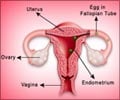Women who use depot medroxyprogesterone acetate (DMPA), commonly known as the birth control shot, are at an increased risk of becoming obese, a new study has found,
Women who use depot medroxyprogesterone acetate (DMPA), commonly known as the birth control shot, are at an increased risk of becoming obese, a new study has found.
In the study, researchers at the University of Texas Medical Branch (UTMB) found that women using DMPA gained an average of 11 pounds and increased their body fat by 3.4 percent over three years.However, women who switched to nonhormonal contraception began to slowly lose the weight and fat mass they gained - nearly four pounds over two years, while those who used oral contraception after the shots gained an average of four additional pounds in the same time span.
The amount of weight gain was dependent on the length of time DMPA was used, as the rate of weight gain slowed over time.
"One concern is DMPA's link to increased abdominal fat, a known component of metabolic syndrome, which increases the risk of cardiovascular disease, stroke and diabetes," said lead author Abbey Berenson, M.D., professor in the Department of Obstetrics and Gynecology and director of the Center for Interdisciplinary Research in Women's Health at UTMB.
For the study, the researchers followed 703 women in two age categories, 16- to 24-years-old, and 25- to 33-years-old, using DMPA, oral (desogestrel) or nonhormonal (bilateral tubal ligation, condom or abstinence) contraception for three years.
DMPA users who discontinued this method and selected another form of birth control were followed for up to two additional years.
Advertisement
When researchers compared all three groups, they found that DMPA users were more than twice as likely as women using nonhormonal or oral birth control to become obese over the next three years.
Advertisement
Women using oral contraception did not gain more weight than those using a nonhormonal form of birth control. However, the researchers found that their body fat increased slightly while their lean body mass (muscle) decreased.
Researchers said this was less likely among those women who exercised regularly and consumed a healthy diet that included increased protein intake.
The study appears in the March 4 issue of the American Journal of Obstetrics and Gynecology.
Source-ANI
THK/L













